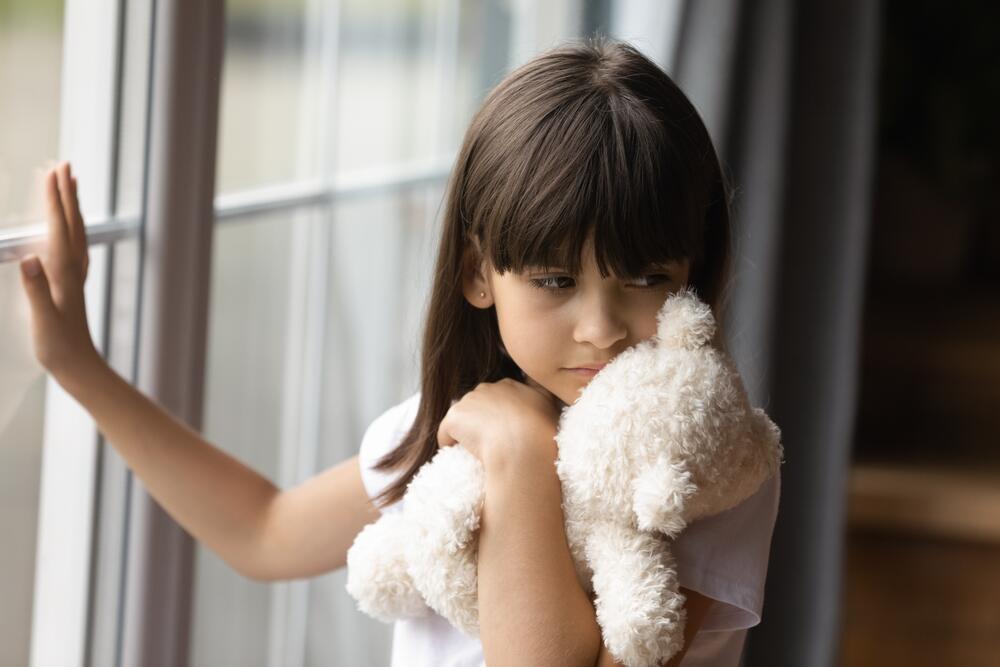Getting your Trinity Audio player ready...
My ten-year-old daughter recently returned from an art class with a large oil painting she drew on canvas depicting a stormy sea, a red sunset sky, and an Israeli flag sinking among the waves. In the red sky, a plane flies and drops bombs. The painting is amazing but worrisome at the same time.
For the first time in who knows how long since October 7, I asked myself whether my children living in central Israel are at risk of physical or psychological harm and whether as a parent I am putting them in an intolerable situation.
This question becomes even more acute for the children of evacuees, children who live in hotels and children who experience sirens or have experienced anxiety on a regular basis. Is Israel a safe place for today's children?
A simple answer could be that we have no other country. Another answer could be that there is simply no choice, and our life, home, and livelihood are only here, and a third answer could be that even in London, Paris, and New York it is dangerous for Jews and Israelis. All these answers do not answer the question, but only stress that we as parents have no choice in this complex situation.
According to Israeli law, the "severe risk of physical or psychological harm or an intolerable situation for children" is similar to the convention Israel signed like most countries. This definition allows courts, to stand against the return of an abducted child to their country of origin, despite the obvious obligation. This is an exception that is supposed to be activated in extreme cases.
Recently, several courts around the world have debated and ruled on whether Israel is a dangerous place for children. These rulings are not only causes for concern but serve as a sad reflection of our children's situation. Although the majority still deem Israel safe, there's a minority who think it is dangerous here. Interestingly, courts did not rule Israel unsafe for children during the Gulf War with threats of chemical weapons. Now the situation has changed.
How did the courts come to debate this question? The answer is that many Israeli families are currently engaging courts in Europe and the United States, challenging them with questions that complicate children and politics.
Divorced parents of children traveled with their children abroad during the war, with the consent of the other parent, due to concern for their safety. The need to stay away from turmoil and the need to make it up to the children is understood. More parents and children will travel as we approach summer vacation.
In some cases, one parent decided, while staying abroad, that they do not want to return to Israel, due to escalating tensions or that emotionally they feel that it is not the right time to return to Israel. In that case, the parent in Israel is powerless because despite the Israeli court siding with the local parent, they are unable to force international courts to hold their ruling. Basically, the local parent must turn to a foreign court in the child's location.
The Hague Convention which aims to protect children requires countries to return children to their country of origin. However, there is a special clause that allows a court to refuse if the child's return exposes them to a severe physical or psychological risk or places them in an unbearable situation.
In Portugal, for example, where many Israelis have gone, several court rulings have rejected requests to return children to Israel, including to Tel Aviv. The reason was the risk and the intolerable situation it would cause for the child. A court in Portugal described in detail the dangers of war for children in Israel, determining there is a real security risk to the child's well-being. A 7-year-old girl's anxiety reflected her mother's, according to a psychologist who spoke with the former.
The court disregarded an Israeli court ruling that determined there was no danger to the girl and also did not consider a letter written by the Israeli consul describing everyday life in central Israel. According to the Justice Ministry, the international department is aware of the issue that there are many similar rulings across Europe and the ministry explains to parents the low chances in these appeals. Even Justice Minister Yariv Levin dealt with the issue recently, but Israel cannot intervene in legal proceedings.
Many courts around the world favor the Israeli side such as the United States or Germany, which politically support Israel. In Germany, a court ruling was given stating that it is possible to instruct parents to return their children to Israel because it has advanced means to ensure their safety like the Iron Dome. The judges can rule these cases by analyzing current events, their perspective on the war, and their justification for the war. The war also shakes family court decisions and affects the outcome.
The dilemma of whether it is dangerous to raise children here, whether today's routine is a tolerable situation for them, is an open and personal question and needs to be dealt with family-wise. When parents are divided on the answer, the courts attempt to answer the question, and it is unpleasant at times in Europe. The stormy sea that my ten-year-old daughter painted, with the sinking flag and the red sky, makes the dilemma stand out. I guess when I ask my daughter that question, she will still tell me that she has no other country.
- Adv. Shmuel Moran is an expert in the fields of family and inheritance law





